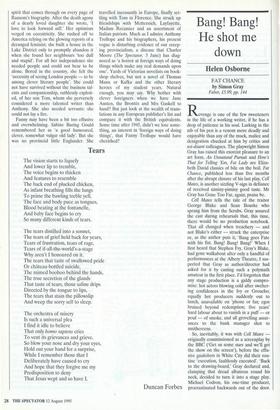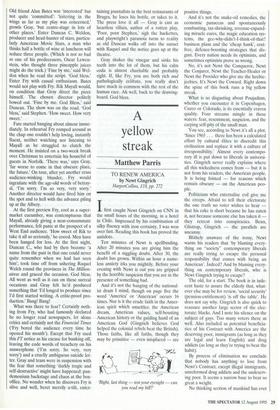Bang! Bang!
He shot me down
Helen Osborne
FAT CHANCE by Simon Gray Faber, £5.99, pp. 144 Revenge is one of the few sweeteners in the life of a working writer, if he has a drop of patience in his soul. Lurking in the nib of his pen is a venom more deadly and enjoyable than any of the muck, malice and denigration chucked at him by critics and soi-disant colleagues. The playwright Simon Gray has raised this exorcist pleasure to an art form. An Unnatural Pursuit and How's That for Telling 'Em, Fat Lady are Eliza- beth David classics of bile on the boil. Fat Chance, published less than five months after the abrupt closure of his last play, Cell Mates, is another sizzling V-sign in defiance of received niminy-piminy good taste. Mr Gray has Gone Too Far, again; praise be.
Cell Mates tells the tale of the traitor George Blake and Sean Bourke who sprang him from the Scrubs. Gray assured the cast during rehearsals that, this time, there would be no production notebook. That all changed when treachery — and not Blake's either — struck the enterprise or, as the author puts it, 'Bang goes Fate with his fist. Bang! Bang! Bang!' When I first heard that Stephen Fry, Gray's Blake, had gone walkabout after only a handful of performances at the Albery Theatre, I sus- pected that Gray as author/director had asked for it by casting such a polymath amateur in the first place. I'd forgotten that any stage production is a giddy compro- mise: hot actors blowing cold after swelter- ing confidences in the Ivy or Groucho; equally hot producers suddenly out to lunch, unavailable on 'phone or fax; egos bruised beyond redemption; five years' hard labour about to vanish in a puff — or pouf — of smoke, and all grovelling assur- ances to the bank manager shot to smithereens.
So, inevitably, it was with Cell Mates originally commissioned as a screenplay by the BBC (`Get us some stars and we'll get the show on the screen'), before the effu- sive gauleiters in White City did their rou- tine 'execution, faultlessly executed'. 'Back to the drawing-board,' Gray declared and, clamping that dread albatross round his neck, decided to turn it into a stage play. Michael Codron, his one-time producer, procrastinated backwards out of the door. Old friend Alan Bates was 'interested' but not quite 'committed': 'loitering in the wings as far as my play was concerned,' growls Gray, tut centre-stage in lots of other places.' Enter Duncan C. Weldon, producer and head-hunter of stars, particu- larly American Movie Stars, a man who thinks half a bottle of wine at luncheon will seduce three people. (Which is not so bad as one of his predecessors, Oscar Lowen- stein, who thought three pineapple juices might do the trick.) 'Fine by me,' said Wel- don when he read the script. 'God bless.' Enter Fry with casual enthusiasm. Bates would not play with Fry. Rik Mayall would, on condition that Gray direct the piece himself. The chosen director politely bowed out. 'Fine by me. God Bless,' said Duncan. The show was on the road. `God bless,' said Stephen. 'How sweet. How very sweet.'
Fate started banging about almost imme- diately. In rehearsal Fry romped around as the chap one couldn't help loving, instantly fluent, neither watching nor listening to Mayall as he struggled to clutch the moment. He insisted on a two-week break over Christmas to entertain his houseful of guests in Norfolk. 'There was,' says Gray, `far worse to come in that obscure place, the future.' On tour, after yet another crass audience-winking blunder, Fry would ingratiate with the age-old words of betray- al, 'I'm sorry. I'm so very, very sorry.' Another director would have fired him on the spot and to hell with the advance piling up at the Albery.
At the first preview Fry, cool as a super- market cucumber, was contemptuous that Mayall, already giving a near-consummate performance, felt panic at the prospect of a West End audience. 'How sweet of Rik to take it all so seriously,' he cooed. Men have been hanged for less. At the first night, Duncan C., who had by then become 'a name from the past in that one could never quite remember when we had last seen him', took time off from ushering Raquel Welch round the provinces in The Million- airess and graced the occasion. God bless. All went as well as it can on these surreal occasions and Gray felt he'd produced something that 'I'd longed to produce since I'd first started writing. A critic-proof pro- duction.' Bang! Bang!
What was there to fear? Certainly noth- ing from Fry, who had famously declared he no longer read newspapers, let alone critics and certainly not the Financial Times (Try bored the audience every time he opened his mouth'). Except that Fry used this FT notice as his excuse for bunking off, leaving the code words of treachery on his answerphone (I'm sorry. So very, very sorry') and a cruelly ambiguous suicide let- ter. Gray and team were in suspension with the fear that something `darkly tragic and self-destructive' might have happened: pan- demonium backstage and chaos at the box- office. No wonder when he discovers Fry is alive and well, beret merrily a-tilt, enter- taining journalists in the best restaurants of Bruges, he loses his bottle, or takes to it. The press love it all — Gray is cast as heartless villain, author of a rotten play, `Poor, poor Stephen,' sigh the hackettes, and playwright's paranoia turns to reality as old Duncan walks off into the sunset with Raquel and the notice goes up at the theatre.
Gray shakes the vinegar and sinks his teeth into the lot of them, but his calm coda is almost charitable and probably right. If, like Fry, you are both rich and pathologically celibate, you really don't have much in common with the rest of the human race. Ah well, back to the drawing- board. God bless.



















































 Previous page
Previous page